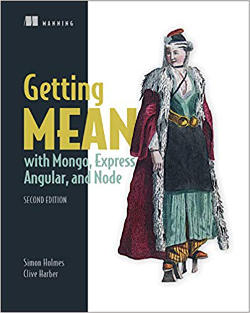| Getting MEAN with Mongo, Second Edition |
|
Author: Simon Holmes and Clive Harber The so-called MEAN stack of MongoDB, Express, Angular and Node.js offers the tools for developing data-driven web applications. The problem is that each of the applications in the stack is worthy of a book in its own right. The book starts with an introduction to the individual components that make up the stack, then goes on to discuss how to put together a MEAN stack architecture. It is a second edition that had been revised and updated to cover Angular 2, Node 6 and JavaScript ES2015 (ES6). Having set the scene, the authors then move on to building a node web application. This starts with a chapter on setting up a MEAN project, then explains how to build a static site with Node and Express.
The combination of MongoDB and Mongoose for building a data model is the topic of the next chapter, after which there are two good chapters on writing and consuming a REST API to expose the MongoDB database to your app, and then using the API to consume the API from within Express. Having dealt with the basics of the back end, part three of the book moves on to creating a front end using Angular. The authors start with a chapter on creating an Angular application with TypeScript before looking at building a single page application with Angular. The book ends with chapters on authentication and user sessions, and how to use an authentication API in Angular apps. Learning one application at a time is hard enough, tackling four main applications and another six or seven ancillary ones makes for a major headache. This is a good book to introduce you to the multiple elements of the stack, but I'm not sure it's enough on its own. There are also the usual problems of there being multiple versions of each of the components, and the interactions between the elements aren't necessarily straightforward. It is worth checking out the errata online as the code in the book is best seen as explaining the concepts rather than being designed for 'type this and compile it for a finished solution'. I'd still recommend the book as providing a good explanation of how the MEAN stack fits together, but you may well need to read further. To be informed about new articles on I Programmer, sign up for our weekly newsletter, subscribe to the RSS feed and follow us on Facebook or Linkedin.
Related Reviews |
|||
| Last Updated ( Saturday, 28 November 2020 ) |

